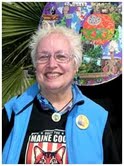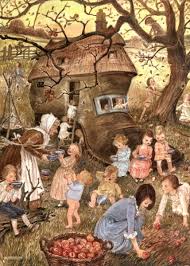
There was an old woman who lived in a shoe,
She had so many children she didn’t know what to do.
She gave them some broth without any bread;
She whipped them all soundly and put them to bed.
Look! Here she comes. Like most old women, she has a lot to say. Let’s listen in:
“Well, that’s what an old nursery rhyme says. But I’m that old woman, and I can tell you for sure that the only thing ‘true’ about that rhyme is that I’m old. I’m older than anyone I know. Oh, I see you there, eavesdropping. That’s okay. You’re welcome here.
 You know what? I’ve been called many names by the (mostly) men who make up those rhymes and stories. I’ve been the old witch in the candy house who serves pie to children and then serves the children in the pie. (But did that German guy who wrote that opera about me ever say who eats those pies?) I’ve been the thirteenth old woman at the christening who wasn’t invited and brings a curse that’s as big as the blessings from the first twelve. I’ve been the evil, wicked, mean stepmother.
You know what? I’ve been called many names by the (mostly) men who make up those rhymes and stories. I’ve been the old witch in the candy house who serves pie to children and then serves the children in the pie. (But did that German guy who wrote that opera about me ever say who eats those pies?) I’ve been the thirteenth old woman at the christening who wasn’t invited and brings a curse that’s as big as the blessings from the first twelve. I’ve been the evil, wicked, mean stepmother.
Hah! Don’t you believe it. That’s just blather and botheration. I’m an ordinary old woman who don’t hold with living tamed in town. I’d rather live out here in the woods and away from your so-called civilization. You know what? It’s safer out here.
Oh, and I don’t live in a real shoe. I’ve built myself a really, really big house that’s backed up against a fairy mound and, gosh, it grew to be ten stories high. My front porch and front yard are kind of round…makes it hard to get inside my house. Well, it’s a minefield out there. They’ve got armies. Not company I want. When the word “feminist” is invented, you know what? That’s what I’ll be one of. A kind of feminist warrior. A militant crone and a babysitter at the same time.
Well, the tall part of my house accommodates the children. I take ’em in. I feed ’em. I give ’em a safe, warm place to sleep. Where do they come from? You remember that big Children’s Crusade they held a thousand years ago? Most of them never made it back home. I got some of ’em here. You know about kids that get lost or kidnapped? I rescue as many as I can. Kids that are whipped and starved? Little girls and boys sold into brothels or living on the streets? Little girls sold as so-called wives to old men and then sacrificed when those old men die? I bring as many of ’em here as I can. But how they get here is my secret. All you need to know is that the older children and I have worked ourselves into a kind anti-army. We find the lost children. I keep ’em here, and when they’ve grown up stronger, I send ’em out to do good works in the world. But they can always come home here.
Yeah, so much for “she didn’t know what to do.” I know exactly what to do! Always have. I’ve built up a rescue army and we find lost kids. Who else on earth does that? You know what? Here’s how that old verse oughta go:
There was an old woman who lived out of reach
With all the dear children she’d gathered to teach.
She taught ’em the old ways, like kindness toward all…
And asks, so why’s that old teaching so hard to recall?”
Barbara Ardinger, Ph.D. (www.barbaraardinger.com), is a published author and freelance editor. Her newest book is Secret Lives, a novel about grandmothers who do magic. Her earlier nonfiction books include the daybook Pagan Every Day, Finding New Goddesses (a pun-filled parody of goddess encyclopedias), and Goddess Meditations. When she can get away from the computer, she goes to the theater as often as possible—she loves musical theater and movies in which people sing and dance. She is also an active CERT (Community Emergency Rescue Team) volunteer and a member (and occasional secretary pro-tem) of a neighborhood organization that focuses on code enforcement and safety for citizens. She has been an AIDS emotional support volunteer and a literacy volunteer. She is an active member of the neopagan community and is well known for the rituals she creates and leads.


I wish I’d known you as a child
LikeLike
Love, Love, Love!!!
LikeLike
What a beautiful reframe. If only the new shoe really existed!!
LikeLike
Its interesting
O
LikeLike
Wonderful.
I love the “how it ought to go” verse retort.
LikeLike
I was fortunate to be found by such an “old woman” when I was a child Barbara, and your story brought tears to my eyes for all the little children suffering today in places of violence.
LikeLike
Timely and timeless! Thank you!
LikeLike
Thank you, Barbara. The Truth!
LikeLike
wonderful poem! :)
your story brought tears into my eyes
hats off to her :D
LikeLike
Yesterday I went to the 90th birthday celebration of a blessed old woman who saved many lost souls wandering in the Oregon wilderness. We came as children; she sent us out as women, confident of who we are. I am printing your article to send to her today. Thank you.
LikeLike
Thank you. This is beautiful. There are so many ways to save lost children and I have a feeling the collective work of this group is contributing to that in many powerful ways.
LikeLike
Thank you all for your kind words. Now I’m beginning to wonder what Mother Hubbard might be saying. I bet she lives with more than one hungry dog. Maybe she runs an animal-rescue agency??
LikeLike
I hope she does !!
LikeLike
I so enjoy your writing and I really appreciate how you took the old stereotypes and turned them on their ear. The rhyme at the end is perfect.
LikeLike
You know what? It took me all day to make that alternative nursery rhyme work. First I could get a good rhyme that made sense. Then I couldn’t get the rhythm to work. But it finally came out more or less even. Not perfect, but satisfactory. I guess persistence pays, eh?
LikeLike
What a wonderful reworking of that old nursery rhyme. Kudos to you!
LikeLike
Lovely, Barbara. Now that I have a 3 year old grandchild, I am questioning the value of all the old nursery rhymes. I know they connect us on a cultural level but their meaning is so elusive sometimes and often detrimental. Thanks for the re-do!
LikeLike
OK, now I get to be a scholar. I have a book titled The Annotated Mother Goose (1962) by William S. Baring-Gould and Ceil Baring-Gould. The Baring-Goulds tell us that the rhyme about the old woman who lived in the shoe seems to have first been published in 1781 by Joseph Ritson, an English antiquarian, in his book Gammer Gurton’s Garland. The footnotes (annotations) say It’s possible that the “old woman” is Victorian England’s Parliament, which starved the empire’s subjects around the world. The “old woman” may also have been James I (an unpopular king in both Scotland and England) or Catholic clergy.
There’s no explanation, however, for the sexism we see today in so many of these old nursery rhymes. Maybe nobody noticed the sexism until now? I dunno. When my son was a baby, I didn’t read these rhymes to him. Too many of them are actually sadistic. But it’s fun to parody them!
LikeLike
I didn’t read any old nursery rhymes to our four when they were small either….but I would most definitely have read them your parodies !!
LikeLike
Reblogged this on Mysa.
LikeLike